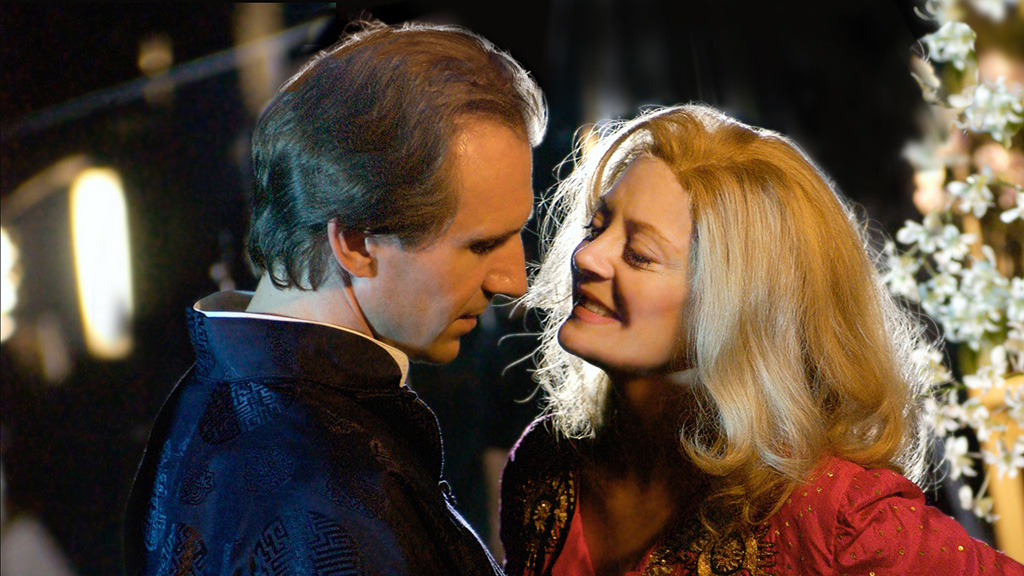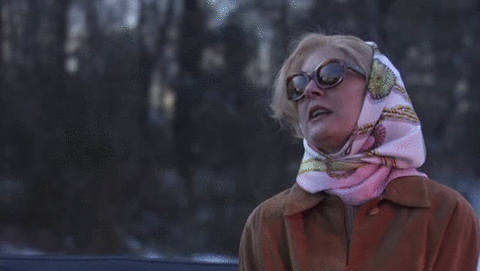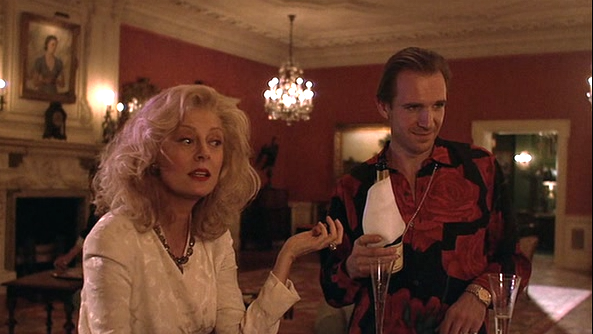HBO’s LGBT History: Bernard and Doris (2008)
 Wednesday, September 23, 2015 at 12:31PM
Wednesday, September 23, 2015 at 12:31PM
Manuel is working his way through all the LGBT-themed HBO productions.
Last week we looked at the provocatively titled but rather limp documentary Middle Sexes - Redefining He and She. This week, we turn our attention to Bernard and Doris, a rather enjoyable little film about billionairess Doris Duke and her gay butler Bernard Lafferty. It’s an otherwise lightweight exercise for actors and director alike but it does allow us to talk about that ubiquitous “gay guy/straight gal” pairing we’re all too familiar with.

Bernard and Doris (DVD)
Directed by: Bob Balaban
Written by: Hugh Costello
Starring: Susan Sarandon, Ralph Fiennes, James Rebhorn.
At one point in Bob Balaban’s HBO film, Doris Duke, “the richest girl in the world” as she was known ever since her father left his entire fortune to her, demands that Bernard - the increasingly flamboyant Irish butler she’s grown quite fond of - step aside from driving and let her take the wheel. She’s much too drunk to bear his slow pace and much too bossy to let herself be convinced otherwise. Inevitably, the unlikely couple are stopped by a cop and Doris is asked to step outside the car and told she’ll have to be breathalized. More...

“No, I don’t want that.”
It was at this point that I wrote down in my notes: Karen Walker. How could you not, right?
Of course, Sarandon’s character is much more grounded but Mullally’s iconic Will & Grace cannot help be invoked here, especially as that show’s structural pairing (one gay guy, one fun gal) is here refracted and deconstructed. The more Lafferty (whose earlier employers include Liz Taylor and Peggy Lee) gets involved with Miss Duke, the more extroverted, confident, and, tragically, drunk he becomes.
This is why Will & Grace and every other gay guy/straight girl pairing came to mind; here was, yet again, a pairing that gave us a woman in full control of her sexuality (Sarandon keeps a boy toy after giving up on marriage) and a gay man whose sexuality is absent in all but his wardrobe and mannerisms. Here was also the sense that this type of relationship is self-destructive even as it shines with the veneer of necessity. And yet, given Doris’s estate and position, it presents the relationship as already existing on an imbalance: it is Bernard who’s left alone in the Newport home while Doris jet-sets around the world. His life, which as he notes late in the film, he’s sacrificed for her, all but disappears once he’s not around her. Is this what drives him to drink? Is this what keeps her tethered to him despite his faults?

There’s a certain tragedy in such a figure though Balaban’s film frames it as a rather trifle of a story. One wishes the film had more to say: about Doris’s disregard for her butler (does she, in the end, care for or merely need him?), about Bernard’s own sense of individuality (what does he want from her?), about the seemingly self-destructive relationship they nevertheless inhabit (is this a cautionary tale?).
Finished the same year as Will & Grace went off the air (though not broadcast on HBO for another two years), Bernard and Doris exists in a rather transitional space. It’s not quite an uncritical throwback to stereotypes: Lafferty, after all, is a well-rounded if still tragic figure who remains unattached (though that after all, was the “true story” behind the film). But it’s also not quite a step forward (or anywhere) in terms of representation. Rather, it’s an example of something we’ll continue to see in future feature and tv projects, of characters whose sexuality is both central and negligible. Characters who are defined but not confined by it and who speak in different registers, able to be clichés and exceed them.

I mean, this is after all, the last image Balaban provides of Lafferty. (Only the pesky end credits tell us he died over alcohol issues three years later).


Fun Awards Fact: Sarandon and Fiennes earned nominations for their portrayals at the Golden Globes (Sarandon’s eighth, Fiennes’s third; he was also nominated that year for The Duchess) and at the Emmys (Sarandon’s third, Fiennes’s first). They both left empty-handed. In fact, both of them have yet to win either statuette! They lost to two awards season mainstays that year, Mr. and Mrs. John Addams themselves, Paul Giamatti and the lovely Laura Linney.
Next Week: We focus on yet another documentary, Be Like Others, which, as its alternate title suggests, focuses on being Transsexual in Iran (YouTube).



Reader Comments (11)
Susan Sarandon should be declared a national treasure. Unfortunately she's banned from The White House.
I liked this movie a lot, and enjoyed both performances - particularly Fiennes. I think this could have been a much larger, grander affair....it seemed rather small to me. It could have used more lavish set pieces, a grander scope, much like Behind the Candelabra
I love Susan Sarandon. Doris is probably the best role she has played since her Oscar. Ralph Fiennes is marvelous in this movie. He's so good!
A very enjoyable film, Sarandon & Fiennes make the stereotypical dialogue more interesting, just because they are such good actors, they elevate any material.
They are both treasures, and always seem to be taken for granted.
It's worth watching just for the outfits Fiennes wears.
What? Is that true? How on earth is she banned from the white house? Lolz
Susan is indeed a treasure, and she hasn't won a golden globe?! What?
I really want to watch this movie.
http://www.huffingtonpost.com/2012/04/22/susan-sarandon-white-house_n_1444374.html
I suspect conservative administrations assumed she was a PR domestic terrorist.
Susan Sarandon is amazing and inexpilcably underused nowadays. This llittle movie was a big showcase of her talent. Yes, since her Oscar win she hasn't been given great roles in many good movies, but she has always been deeply moving and wildly funny (often both at the same time) in titles like Stepmom, Igby Goes Down, Moonlight Mile, Elizabethtown, In the Valley of Elah, Jeff Who Lives At Home, Arbitrage. She deserves a huge comeback both critically and commercially. Hope The Meddler, for which she has beeen praised at TIFF, will fix this next year.
It's 20 years since her win and not 1 nomination despite 4 times I can think of more in supporting where she was worthy and to think she was one of THE premiere actresses of late 80's and early 90's.
Well, good on Michael Moore for telling it like it is about Waiting for Superman, anyway. I'm nostalgic for the days when Hollywood made movies about heroic teachers.
Topic: This is a good, underappreciated film for anyone who likes its stars (and who wouldn't?).
Great read, Manuel! Although you forgot The Lovely Laura Linney needs to be capitalised, as a quasi-trademarked TFE staple.
I preferred the other movie with Lauren Bacall playing Doris Duke.